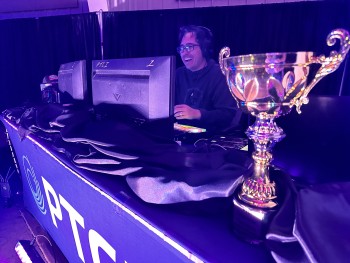Dota 2 is a five-on-five multiplayer esports game that is billed as one of the most difficult to play in the esports universe. Game play includes a choice of more than 100 characters (Dota Heroes) who have unique personalities and roles within the game. Each Dota Hero is intended to be played differently, with differing personalities, skills and strengths, so team composition (and how that team goes up against a competitor) is a critical element of battlefield management. In the actual human environment, clear and effective interactions among the [live] players on each team – drawing on strategic planning, communication and team building – are necessary to achieve virtual (and actual) victories.
And in recent years the prize pool for the Dota 2 International tournament is higher than the World Series. And the NBA finals. And the Super Bowl. And the Stanley Cup (see this report from Worcester Polytechnic Institute).
There is a lot of talk about how esports can be a talent development pipeline for the broadband and tech industry. And as is the case with many optimistic conversations, there is a tendency to fall back on platitudinal statements that violate some of the fundamental instructions uttered in every law school: Prove it. Be specific. Explain it. Tell me why.
So here goes: Gamers are split nearly evenly among men and women (52%/48%), and the average gamer age is 33. So, we can dispense with the conventional image of a young guy in a dark basement with a looming Mountain Dew. Gaming is as racially diverse as the overall U.S. population: 60% of gamers are white (59.3% of the U.S. population is white); 20% of gamers are Latino (compared to 18.9% for the U.S. population); 15% of gamers are Black (12.6% of U.S. population); and 5% of gamers of Asian (nearly spot-on to population rate of 5.9%). Now, to be sure, these numbers might slide a bit depending on the survey or source material, but on a collective average the numbers reflect that by either sex or racial demographic, gaming is embraced nearly equally across all demographics.
Now let’s look at workforce development. While the average age of a gamer is 33, the average “go pro” age for esports (which are electronic games played competitively) is 16-18 years old, with an average retirement age between 22 and 24 years of age. If that seems young, consider that the average NBA player retires at 26; NFL, 26 or 27; MLB, 29. But, the average esports career nets five years, longer than the NFL (3.3), NBA (4.5), and just slightly shorter than MLB (5.6). And esports players rack up skills beyond the gameplay.
Several reports illustrate how gamers leverage the skills they hone in esports into career building blocks. These include digital fluency, which includes understanding game platforms, troubleshooting hardware and software glitches and communicating effectively about and within virtual environments. Esports also builds skills like those obtained in more traditional varsity environments, including leadership and the ability to fulfill a role as part of a team. Finally, esports help players develop strategies for risk and pattern recognition.
Within the broadband and tech industry, we identify esports as an opportunity to cultivate skilled workers. But just like how broadband is rapidly becoming an integral element of many sectors including education, health care and public safety, esports players can apply their skills to those industries, as well. The use of virtual reality and artificial intelligence in healthcare is growing; edtech and educational gaming are acquiring new champions; cybersecurity is increasingly recognized as a core element of business planning.
These factors are not lost on educators. More than $16M in esports scholarships were awarded by U.S. colleges and universities in 2021. Harrisburg University offers full-tuition scholarships, including housing, to esports teams. The University of Arizona offers a minor in esports. The University of California, Irvine, reports more than $1M in corporate sponsorship revenues.
In sum, esports participation matches the demographic character of the nation; builds both technical and soft skills; and is growing as an attractive investment for leading businesses and universities. It’s a good time to get involved.


